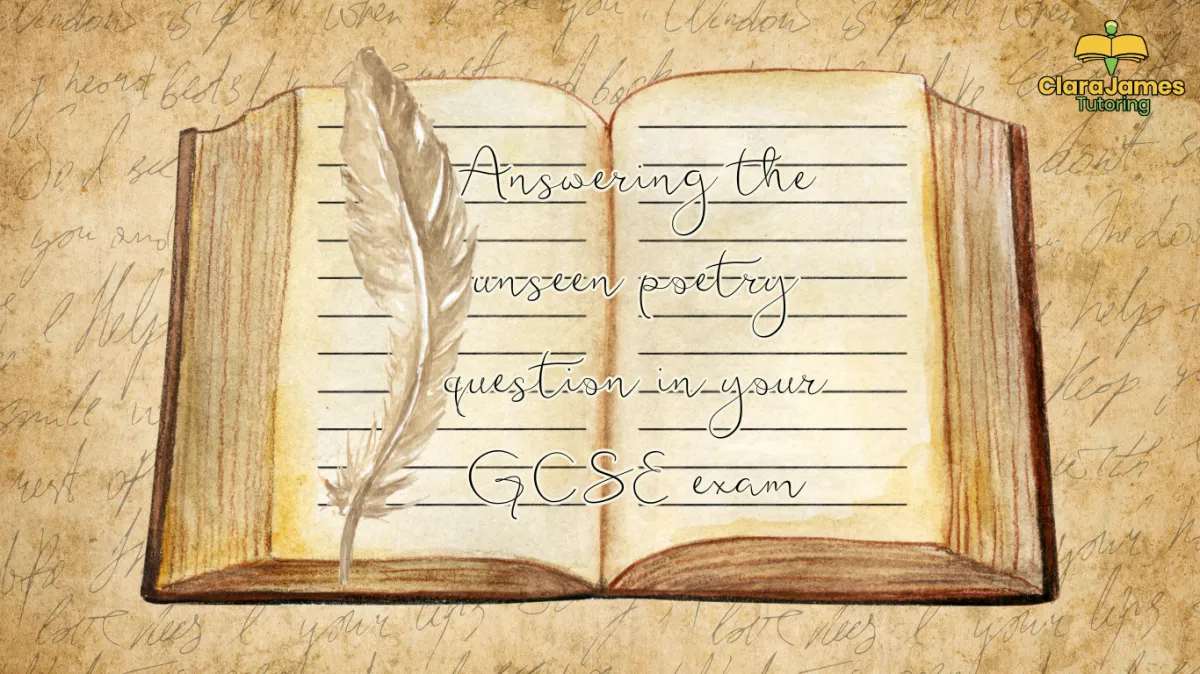Clara James Tutoring
BLOG POSTS

Unseen Poetry: How to attack the GCSE exam
Unseen poetry is the focus of many at the moment as it will be in their English mock next week (good luck).
What I would suggest is read the poem through and get a feel for it.
Then look at the question and reread the poem highlighting anything at all that might be relevant to the question. This can include words or phrases, punctuation, number of stanzas, etc.
Then look at what you’ve highlighted and see if there is a common theme amongst the quotes.
So, for example if the poem is about love but what you’ve highlighted relates to the chaos time, talk about how when you fall in love time has no meaning: “One day of loving her was an ordinary year” You could comment on how the poet uses this metaphor to suggest that time becomes irrelevant or distorted when in the presence of someone you love. A single day feels as rich and full as an entire year, highlighting how love magnifies experiences and makes brief moments feel like forever. Then look for other points that you’ve highlighted that relate to time and use this to reinforce that time loses its meaning when you fall in love. You might also mention the lack of punction shows the speed at which love can happen and how love can feel like a roller coaster that sweeps you away in the moment.
Use multiple pieces of evidence with their analysis to support your point.
Once you have done so, link back to the question and create a new point and respond to this in the same way. Doing it this way makes it more concise and means your analysis for the point can be spread over several pieces of evidence rather than being reliant on just one, and without having to consider multiple points which are all pretty much repeating themselves – ie. The impact that love has on time.
I hope that makes sense:
Point
Lots of evidence (highlighting the technique when appropriate) each linked to analysis.
Link to question
Repeat
Rather than: point, evidence, technique, analyse, link.
I hope this helps.
Good luck
We have created some sentence openers for English Language paper 1, question 2. You might find them helpful for this exam as well. You can find them here if you are interested: Free Download: Sentence openers for GCSE English Language Paper 1
Morning,
I hope the week is going well.
So many people seem to be doing D of E and work experience
at the moment, good luck if that’s you and if you’re at Marlow Camp next
fingers crossed for good weather!
I’ve just finished a lesson on division. It seems to be
something that messes with the brains of so many people.
I found it got easier when I stopped thinking about it as
division and instead thought about it as multiplication. So, if for example I
had the question 396 divided by 3, I would look at it as 3x what = 3. My answer
would be 1. How many times would I need to multiply 3 to get to 9, (my answer
would be 3). Then 3x something = 6. My answer would be 2. Giving me the overall
answer of 132.
I know that’s a really simple example but hopefully it explains
my point.
Thankfully in schools they don’t often seem to need to do
long division, but I’ve worked with a couple of adults (generally nurses for
some reason) who have needed it.
I think I’ll explain this one in a video, as it will be too
complicated to explain it with words as bits get put all over the place. I hope
this makes sense though:
Enjoy the rest of the week and speak soon,
Dawn

